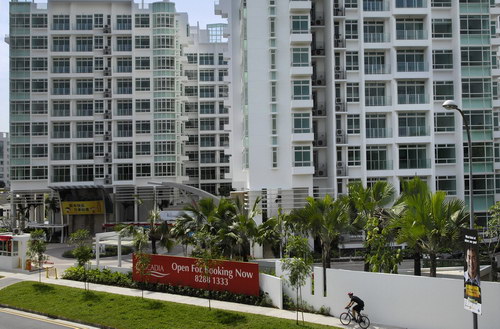Companies
MCC's property arm accelerates overseas expansion
By Hu Yuanyuan (China Daily)
Updated: 2011-02-09 10:43
 |
Large Medium Small |
Real estate arm in Singapore looks to grow rapidly overseas
BEIJING - The real estate arm of China Metallurgical Group Corp (MCC) is quickening property development in Singapore, making it China's first State-owned real estate firm to expand overseas amid rigorous property policies at home.
"Due to quick sales and fast capital withdrawal, Singapore will be our major venture in exploring overseas markets," said Tan Zhiyong, managing director of MCC Land (Singapore) Pte, MCC's Singapore subsidiary.
 |
|
A cyclist passes a newly built condominium project in Singapore. After launching a condominium project in mid-October, China Metallurgical Group Corp's real estate subsidiary in the country is planning a second property project. [Photo/Agencies] |
After two to three years, the company aims to run three to four projects each year, with annual sales exceeding 3 billion yuan ($458 million) to 4 billion yuan, according to Tan.
"With more experience in developing projects in Singapore, we plan to expand our business to Malaysia and Indonesia," he said.
MCC will mainly target local Chinese as its primary customers. According to Tan, nearly half of Singapore's population is Chinese, and many of them have strong purchasing power.
After launching "The Canopy - Executive Condominium" in mid-October, MCC Land's first real estate project in Singapore, the company plans to launch its second property project, "One Canberra", in the near future.
The Canopy, comprising 406 units and located in Yishun, was well-received in the market, thus making top management more confident in quickening the company's business expansion plans.
According to Tan, the major challenge in tapping the Singapore market is to acquire land parcels and receive timely financing.
| ||||
"It is not easy to receive loans from local banks, and getting finance from our group in China usually requires three to six months due to complicated procedures. Therefore, we mainly rely on our own capital in exploring the Singapore market. Such a problem also makes our cooperation with other property developers in the country a bit difficult, as the partner could hardly wait for six months for our capital to get in place," Tan said.
Though MCC has had a presence in Singapore for 16 years, it best known to the public as a contractor. To ensure a successful transition, MCC joined hands with designers, a marketing company, and a law firm to adapt to local trends and protect customer interests.
In Tan's opinion, it is highly necessary for MCC to move up the industry chain to ensure a higher profit margin and diversify risks. "The risks of real estate development overseas, in fact, are less than those in construction contracting," Tan added.
The net profit of property development in Singapore hovers around 15 percent, compared with 5 percent for construction contracting. Meanwhile, property price fluctuations have been minimal for the past two years.
Compared with local property developers, MCC could better manage costs as it is not only a developer but also a contractor, Tan said.
| 分享按钮 |



